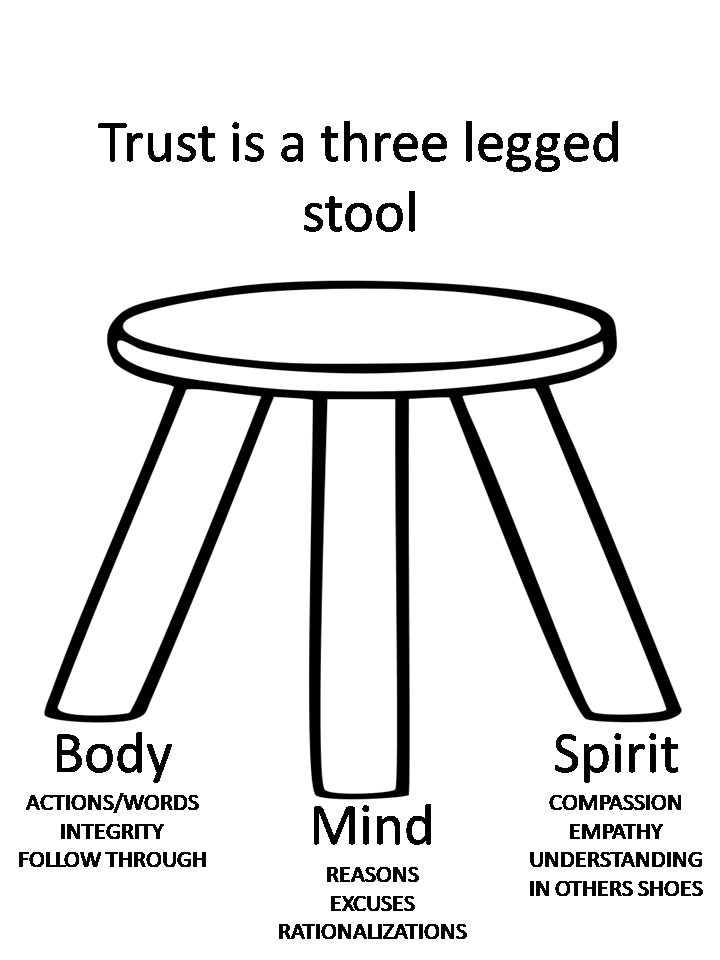WE WON’T BE FOOLED AGAIN!
Being fooled on April Fool’s Day in jest can be fun but being fooled when we trusted someone is not fun. Have you suffered being fooled more than once by the same person or company or even a group? This kind of betrayal can be devastating to our emotional well-being and can have long lasting effects. Some may continue in relationships with these persons or entities, and end up confused, trapped and feeling like a fool.

Want an almost foolproof way of testing if a person or entity is worth your trust?
As a chronic people pleaser, I often found myself in these situations and staying in them being miserable. I felt stuck and unable to clear my head enough to see why I kept letting it happen. When I found this technique, I started using it to test the things that kept happening and it works!
It is as simple as looking at the mind, body and spirit of the person or entity. Look at trust as a warm, cozy comfortable stool you and your partner can be supported on. It requires three sturdy legs to be balanced and stable.
There are some simple questions you can ask yourself to clarify if they are trustworthy and you can use them anytime your emotions are triggered. Because emotions are our red, yellow and green lights, we can use them as a signal us to stop, slow down or go for it. If you get a signal that doesn’t feel good, stop and use this three footed stool to analyze the situation.

#1. ARE THEIR ACTIONS AND WORDS CONGRUENT?
The first thing to look at is their body. Their body is anything they physically do or say. It is any actions and words. Are they congruent? Do they match? Are you being told one thing and seeing, hearing and sensing something else? This is a test for integrity and honesty. If your partner, friend or business says they will do something and then doesn’t, that is a lack. It may be a lack of follow through or time or money and more importantly it is a lack of acting on their word. Right now, do not look at intentions, excuses or reasons; we will do that last. Just write down each of these breaches in honest congruence and integrity. These constitute a crack or maybe a break in the first leg on the stool of warm trust. This doesn’t to mean we judge them as a bad person or company because of they lack in this merely that we may need to withdraw from them to protect and care for ourselves.
#2. ARE THEY GENUINELY AND COMPASSIONATELY ACTING ON THE COMMITMENTS THEY MADE?
Secondly, we look at their spirit or heart. Are they genuinely and compassionately acting on the commitments they made? Can they see your side of things? Is empathy for others, whether partners in relationships or business part of their decision making or are self-driven decisions their norm? If they are normally self-driven, trying to talk to them can be challenging so again, merely write this down as a crack or break in the second leg on the stool of comfortable trust.
#3. DO THEY TAKE RESPONSIBILITY FOR THEIR LACK OF FOLLOW THROUGH OR BLAME OTHERS?
The third question to ask ourselves is what is their reasoning for not doing it? Was it an emergency? Was it truly beyond their control? Okay, we can have compassion and empathy for them. However, if it keeps happening really listen to their reasons. Do they take responsibility for their lack of follow through or are there excuses and blaming and reasons for which they are never responsible? Lack of responsible follow through partnered with blame or excuses demonstrate huge cracks in the third leg of the cozy trust stool. Quite often I have been faced with a lack of follow through on very simple promises and found it especially difficult because I want to give others the benefit of the doubt. Again, write these simple breaches down as cracks in the leg of the trust stool. If the person or company can’t keep simple commitments how can we trust them for big ones?
In the past, I had huge problems trusting in my life and didn’t have clear enough thinking to decipher why.
By using this tool, I started to get clarity and began to learn how to trust. I began by writing down each breach on each leg no matter how small.
A very simple example..
My friend always promised not to aggressively play with my Chihuahua. She is my companion dog and has some training for Love On A Leash but has not finished. The aggressive play made her more hostile and growl at people that tried to touch her. My friend promised over and over to stop doing it but continued. Their reason for not stopping was they just wanted to have fun with the dog. And, even though they knew it was harming my need for her to be a good doggie citizen they thought I was being silly. This small example of not acting on their word, rationalizing it as harmless and not being empathetic to the needs of others permeated our whole relationship. When I finally sat down and wrote out each small breach, and gave them the paper, they began to see how they were belittling their own word, rationalizing their actions, and making my wants unimportant.
This was a huge lesson for both of us. I no longer allow myself to be blamed for making a big deal out of nothing and my friend understands saying they will do something is committing to it. The Trust Stool metaphor is an easy way of opening communication because the three legs are the same for everyone. It also makes it clear if you don’t want to do something it is your responsibility to speak up and not agree to it. Staying true to ourselves while being responsible for our commitments is a super important part of building a warm, cozy comfortable, trusting environment but that is another blog for another day.
